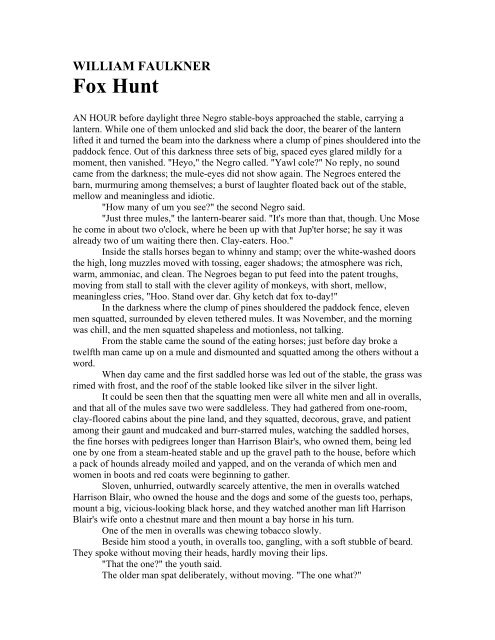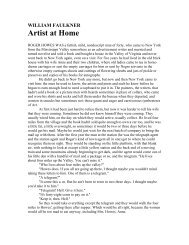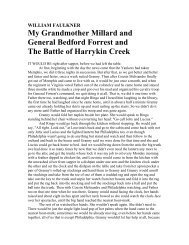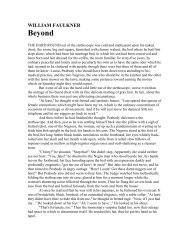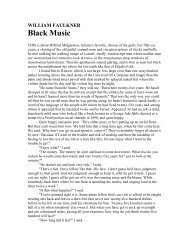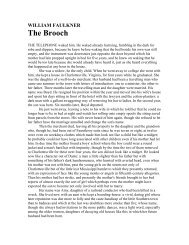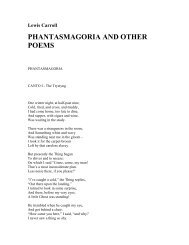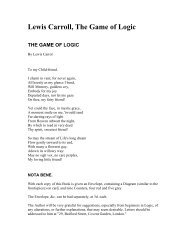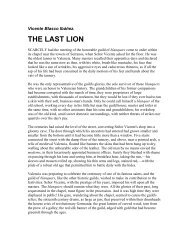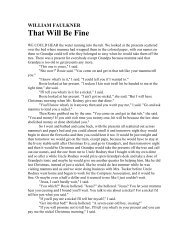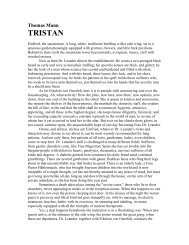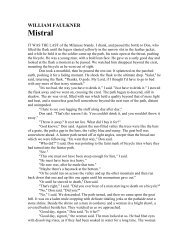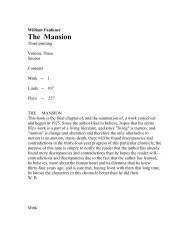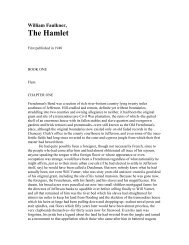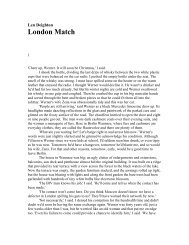WILLIAM FAULKNER, Fox Hunt - literature save 2
WILLIAM FAULKNER, Fox Hunt - literature save 2
WILLIAM FAULKNER, Fox Hunt - literature save 2
You also want an ePaper? Increase the reach of your titles
YUMPU automatically turns print PDFs into web optimized ePapers that Google loves.
<strong>WILLIAM</strong> <strong>FAULKNER</strong><strong>Fox</strong> <strong>Hunt</strong>AN HOUR before daylight three Negro stable-boys approached the stable, carrying alantern. While one of them unlocked and slid back the door, the bearer of the lanternlifted it and turned the beam into the darkness where a clump of pines shouldered into thepaddock fence. Out of this darkness three sets of big, spaced eyes glared mildly for amoment, then vanished. "Heyo," the Negro called. "Yawl cole?" No reply, no soundcame from the darkness; the mule-eyes did not show again. The Negroes entered thebarn, murmuring among themselves; a burst of laughter floated back out of the stable,mellow and meaningless and idiotic."How many of um you see?" the second Negro said."Just three mules," the lantern-bearer said. "It's more than that, though. Unc Mosehe come in about two o'clock, where he been up with that Jup'ter horse; he say it wasalready two of um waiting there then. Clay-eaters. Hoo."Inside the stalls horses began to whinny and stamp; over the white-washed doorsthe high, long muzzles moved with tossing, eager shadows; the atmosphere was rich,warm, ammoniac, and clean. The Negroes began to put feed into the patent troughs,moving from stall to stall with the clever agility of monkeys, with short, mellow,meaningless cries, "Hoo. Stand over dar. Ghy ketch dat fox to-day!"In the darkness where the clump of pines shouldered the paddock fence, elevenmen squatted, surrounded by eleven tethered mules. It was November, and the morningwas chill, and the men squatted shapeless and motionless, not talking.From the stable came the sound of the eating horses; just before day broke atwelfth man came up on a mule and dismounted and squatted among the others without aword.When day came and the first saddled horse was led out of the stable, the grass wasrimed with frost, and the roof of the stable looked like silver in the silver light.It could be seen then that the squatting men were all white men and all in overalls,and that all of the mules <strong>save</strong> two were saddleless. They had gathered from one-room,clay-floored cabins about the pine land, and they squatted, decorous, grave, and patientamong their gaunt and mudcaked and burr-starred mules, watching the saddled horses,the fine horses with pedigrees longer than Harrison Blair's, who owned them, being ledone by one from a steam-heated stable and up the gravel path to the house, before whicha pack of hounds already moiled and yapped, and on the veranda of which men andwomen in boots and red coats were beginning to gather.Sloven, unhurried, outwardly scarcely attentive, the men in overalls watchedHarrison Blair, who owned the house and the dogs and some of the guests too, perhaps,mount a big, vicious-looking black horse, and they watched another man lift HarrisonBlair's wife onto a chestnut mare and then mount a bay horse in his turn.One of the men in overalls was chewing tobacco slowly.Beside him stood a youth, in overalls too, gangling, with a soft stubble of beard.They spoke without moving their heads, hardly moving their lips."That the one?" the youth said.The older man spat deliberately, without moving. "The one what?"
"His wife's one.""Whose wife's one?""Blair's wife's one."The other contemplated the group before the house. He appeared to, that is. Hisgaze was inscrutable, blank, without haste; none could have said if he were watching theman and woman or not. "Don't believe anything you hear, and not more than half yousee," he said."What do you think about it?" the youth said.The other spat deliberately and carefully. "Nothing," he said. "It ain't none of mywife." Then he said, without raising his voice and without any change in inflection,though he was now speaking to the head groom who had come up beside him. "Thatfellow don't own no horse.""Which fellow don't?" the groom said. The white man indicated the man who washolding the bay horse against the chestnut mare's flank. "Oh," the groom said. "Mr.Gawtrey. Pity the horse, if he did.""Pity the horse that he owns, too," the white man said."Pity anything he owns.""You mean Mr. Harrison?" the groom said. "Does these here horses look like theyneeds your pity?""Sho," the white man said. "That's right. I reckon that black horse does like to berode like he rides it.""Don't you be pitying no Blair horses," the groom said."Sho," the white man said. He appeared to contemplate the blooded horses thatlived in a steam-heated house, the people in boots and pink coats, and Blair himselfsitting the plunging black. "He's been trying to catch that vixen for three years now," hesaid. "Whyn't he let one of you boys shoot it or pizenit?""Shoot it or pizen it?" the groom said. "Don't you know that ain't no way to catcha fox?""Why ain't it?""It ain't spo'tin," the groom said. "You ought to been hanging around um longenough by now to know how gempmuns hunts.""Sho," the white man said. He was not looking at the groom. "Wonder how a manrich as folks says he is," again he spat, in the action something meager but withoutintended insult, as if he might have been indicating Blair with a jerked finger "is got timeto hate one little old fox bitch like that. Don't even want the dogs to catch it. Trying tooutride the dogs so he can kill it with a stick like it was a snake. Coming all the waydown here every year, bringing all them folks and boarding and sleeping them, to run onelittle old mangy fox that I could catch in one night with a axe and a possum dog.""That's something else about gempmuns you won't never know," the groom said."Sho," the white man said.The ridge was a long shoal of pine and sand, broken along one flank into gapsthrough which could be seen a fallow rice field almost a mile wide which ended against abrier-choked dyke. The two men in overalls, the older man and the youth, sat their mulesin one of these gaps, looking down into the field. Farther on down the ridge, about a halfmile away, the dogs were at fault; the yapping cries came back up the ridge, baffled,ringing, profoundly urgent.
"You'd think he would learn in three years that he ain't going to catch ere Cal-linafox with them Yankee city dogs," the youth said."He knows it," the other said. "He don't want them dogs to catch it. He can't evenbear for a blooded dog to go in front of him.""They're in front of him now though.""You think so?""Where is he, then?""I don't know. But I know that he ain't no closer to them fool dogs right now thanthat fox is. Wherever that fox is squatting right now, laughing at them dogs, that's wherehe is heading for.""You mean to tell me that ere a man in the world can smell out a fox where even acity dog can't untangle it?""Them dogs yonder can't smell out a straight track because they don't hate thatfox. A good fox or coon or possum-dog is a good dog because he hates a fox or a coon ora possum, not because he's got a extra good nose. It ain't his nose that leads him; it's hishating. And that's why when I see which-a-way that fellow's riding, I'll tell you which-awaythat fox has run."The youth made a sound in his throat and nostrils. "A growed-up man. Hating adurn little old mangy fox. I be durn if it don't take a lot of trouble to be rich. I be durn if itdon't."They looked down into the field. From farther on down the ridge the eager,baffled yapping of the dogs came. The last rider in boots and pink had ridden up andpassed them and gone on, and the two men sat their mules in the profound and winy andsunny silence, listening, with expressions identical and bleak and sardonic on their gaunt,yellow faces.Then the youth turned on his mule and looked back up the ridge in the directionfrom which the race had come. At that moment the older man turned also and,motionless, making no sound, they watched two more riders come up and pass.They were the woman on the chestnut mare and the man on the bay horse. Theypassed like one beast, like a double or hermaphroditic centaur with two heads and eightlegs. The woman carried her hat in her hand; in the slanting sun the fine, soft cloud of herunbobbed hair gleamed like the chestnut's flank, like soft fire, the mass of it appearing tobe too heavy for her slender neck. She was sitting the mare with a kind of delicateawkwardness, leaning forward as though she were trying to outpace it, with a qualityabout her of flight within flight, separate and distinct from the speed of the mare.The man was holding the bay horse against the mare's flank at full gallop. Hishand lay on the woman's hand which held the reins, and he was slowly but steadilydrawing both horses back, slowing them. He was leaning toward the woman; the two menon the mules could see his profile stoop past with a cold and ruthless quality like that of astooping hawk; they could see that he was talking to the woman. They passed so, withthat semblance of a thrush and a hawk in terrific immobility in mid-air, with anapparitionlike suddenness: a soft rush of hooves in the sere needles, and were gone, theman stooping, the woman leaning forward like a tableau of flight and pursuit on alightning bolt.
Then they were gone. After a while the youth said, "That one don't seem to needno dogs neither." His head was still turned after the vanished riders. The other man saidnothing."Yes, sir," the youth said. "Just like a fox. I be durn if I see how that skinny neckof hern... Like you look at a fox and you wonder how a durn little critter like it can toteall that brush. And once I heard him say," he in turn indicated, with less means than evenspitting, that it was the rider of the black horse and not the bay, of whom he spoke"something to her that a man don't say to a woman in comp'ny, and her eyes turned redlike a fox's and then brown again like a fox." The other did not answer. The youth lookedat him.The older man was leaning a little forward on his mule, looking down into thefield. "What's that down there?" he said. The youth looked also. From the edge of thewoods beneath them came a mold-muffled rush of hooves and then a crash ofundergrowth; then they saw, emerging from the woods at full gallop, Blair on the blackhorse. He entered the rice field at a dead run and began to cross it with the unfalteringand undeviating speed of a crow's flight, following a course as straight as a surveyor'sline toward the dyke which bounded the field at its other side. "What did I tell you?" theolder man said. "That fox is hid yonder on that ditchbank. Well, it ain't the first time theyever seen one another eye to eye. He got close enough to it once two years ago to throwthat ere leather riding-switch at it.""Sho," the youth said. "These folks don't need no dogs."In the faint, sandy road which followed the crest of the ridge, and oppositeanother gap in the trees through which could be seen a pie-shaped segment of the ricefield, and some distance in the rear of the hunt, stood a Ford car with a light truck body.Beneath the wheel sat a uniformed chauffeur; beside him, hunched into a black overcoat,was a man in a derby hat. He had a smooth, flaccid, indoors face and he was smoking acigarette: a face sardonic and composed, yet at the moment a little wearily savage, likethat of an indoors-bred and -inclined man subject to and helpless before some naturalinclemency like cold or wet. He was talking."Sure. This all belongs to her, house and all. His old man owned it before theymoved to New York and got rich, and Blair was born here. He bought it back and gave itto her for a wedding present. All he kept was this what-ever-it-is he's trying to catch.""And he can't catch that," the chauffeur said."Sure. Coming down here every year and staying two months, without nothing tosee and nowheres to go except these clay-eaters and Nigras. If he wants to live in a herdof nigras for two months every year, why don't he go and spend a while on LenoxAvenue? You don't have to drink the gin. But he's got to buy this place and give it to herfor a present because she is one of these Southerns and she might get homesick orsomething. Well, that's all right, I guess. But Fourteenth Street is far enough south forme. But still, if it ain't this, it might be Europe or somewheres. I don't know which isworse.""Why did he marry her, anyways?" the chauffeur said."You want to know why he married her? It wasn't the jack, even if they did have apot full of it, of this Oklahoma Indian oil...""Indian oil?"
"Sure. The government give this Oklahoma to the Indians because nobody elsewould have it, and when the first Indian got there and seen it and dropped dead and theytried to bury him, when they stuck the shovel into the ground the oil blowed the shovelout of the fellow's hand, and so the white folks come. They would come up with a newFord with a man from the garage driving it and they would go to an Indian and say, 'Well,John, how much rotten-water you catchum your front yard?' and the Indian would saythree wells or thirteen wells or whatever it is and the white man would say, 'That's toobad. The way the White Father put the bee on you boys, it's too bad. Well, never mind.You see this fine new car here? Well, I'm going to give it to you so you can load up yourfolks and go on to where the water don't come out of the ground rotten and where theWhite Father can't put the bee on you no more.' So the Indian would load his family intothe car, and the garage man would head the car west, I guess, and show the Indian wherethe gasoline lever was and hop off and snag the first car back to town. See?""Oh," the chauffeur said."Sure. So here we was in England one time, minding our own business, when herethis old dame and her red-headed gal come piling over from Europe or somewhereswhere the gal was going to the high school, and here it ain't a week before Blair says,'Well, Ernie, we're going to get married. What the hell do you think of that?' And him afellow that hadn't done nothing all his life but dodge skirts so he could drink all night andtry to ride a horse to death all day, getting married in less than a week. But soon as I seethis old dame, I know which one of her and her husband it was that had took them oilwells off the Indians.""She must have been good, to put it on Blair at all, let alone that quick," thechauffeur said. "Tough on her, though. I'd hate for my daughter to belong to him. Notsaying nothing against him, of course.""I'd hate for my dog to belong to him. I see him kill a dog once because itwouldn't mind him. Killed it with a walking stick, with one lick. He says, 'Here. SendAndrews here to haul this away.'""I don't see how you put up with him," the chauffeur said."Driving his cars, that's one thing. But you, in the house with him day andnight...""We settled that. He used to ride me when he was drinking. One day he put hishand on me and I told him I would kill him. 'When?' he says. When you get back fromthe hospital?' 'Maybe before I go there,' I says. I had my hand in my pocket. 'I believe youwould,' he says. So we get along now. I put the rod away and he don't ride me any moreand we get along.""Why didn't you quit?""I don't know. It's a good job, even if we do stay all over the place all the time.Jees! Half the time I don't know if the next train goes to Ty Juana or Italy; I don't knowhalf the time where I'm at or if I can read the newspaper next morning even. And I likehim and he likes me.""Maybe he quit riding you because he had something else to ride," the chauffeursaid."Maybe so. Anyways, when they married, she hadn't never been on a horse beforein all her life until he bought this chestnut horse for her to match her hair. We went all theway to Kentucky for it, and he come back in the same car with it. I wouldn't do it; I says I
would do anything in reason for him but I wasn't going to ride in no horse Pullman with itempty, let alone with a horse already in it. So I come back in a lower."He didn't tell her about the horse until it was in the stable. 'But I don't want toride,' she says."'My wife will be expected to ride,' he says. 'You are not in Oklahoma now.'"'But I can't ride,' she says."'You can at least sit on top of the horse so they will think you can ride on it,' hesays."So she goes to Callaghan, riding them practice plugs of his with the children andthe chorines that have took up horse riding to get ready to get drafted from the bushes outin Brooklyn or New Jersey to the Drive or Central Park. And her hating a horse like itwas a snake ever since one day when she was a kid and gets sick on a merry-go-round.""How did you know all this?" the chauffeur said."I was there. We used to stop there now and then in the afternoon to see how shewas coming on the horse. Sometimes she wouldn't even know we was there, or maybeshe did. Anyways, here she would go, round and round among the children and one ortwo head of Zigfield's prize stock, passing us and not looking at us, and Blair standingthere with that black face of his like a subway tunnel, like he knew all the time shecouldn't ride no horse even on a merry-go-round and like he didn't care if she learned ornot, just so he could watch her trying and not doing it. So at last even Callaghan come tohim and told him it wasn't no use. 'Very well,' Blair says. 'Callaghan says you may beable to sit on the top of a painted horse, so I will buy you a horse out of a dump cart andnail him to the front porch, and you can at least be sitting on top of it when we come up.'"'I'll go back to momma's,' she says."'I wish you would,' Blair says. 'My old man tried all his life to make a banker outof me, but your old woman done it in two months.'""I thought you said they had jack of their own," the chauffeur said. "Why didn'tshe spend some of that?""I don't know. Maybe there wasn't no exchange for Indian money in New York.Anyways, you would have thought she was a conductor on a Broadway surface car.Sometimes she wouldn't even wait until I could get Blair under a shower and a jolt intohim before breakfast, to make the touch. So the gal goes to the old dame (she lives onPark Avenue) and the gal...""Was you there too?" the chauffeur said."Cried... What? Oh. This was a maid, a little Irish kid named Burke; me and herused to go out now and then. She was the one told me about this fellow, this Yale collegeboy, this Indian sweetheart.""Indian sweetheart?""They went to the same ward school out at Oklahoma or something. SwappedMasonic rings or something before the gal's old man found three oil wells in thehenhouse and dropped dead and the old dame took the gal off to Europe to go to theschool there. So this boy goes to Yale College and last year what does he do but marry agal out of a tank show that happened to be in town. Well, when she finds that Callaghanhas give her up, she goes to her old woman in Park Avenue. She cries. 'I begin to thinkthat maybe I won't look funny to his friends, and then he comes there and watches me. Hedon't say nothing,' she says, 'he just stands there and watches me.'
"'After all I've done for you,' the old dame says. 'Got you a husband that any gal inNew York would have snapped up. When all he asks is that you learn to sit on top of ahorse and not shame him before his swell friends. After all I done for you,' the old damesays."'I didn't,' she says. 'I didn't want to marry him.'"'Who did you want to marry?' the old dame says." I didn't want to marry nobody,' the gal says."So now the old dame digs up about this boy, this Allen boy that the gal...""I thought you said his name was Yale," the chauffeur said."No. Allen. Yale is where he went to this college.""You mean Columbia.""No. Yale. It's another college.""I thought the other one was named Cornell or something," the chauffeur said."No. It's another one. Where these college boys all come from when thesehotchachacha deadfalls get raided and they give them all a ride downtown in the wagon.Don't you read no papers?""Not often," the chauffeur said. "I don't care nothing about politics.""All right. So this Yale boy's poppa had found a oil well too and he was lousywith it too, and besides the old dame was mad because Blair wouldn't leave her live in thehouse with them and wouldn't take her nowheres when we went. So the old dame givethem all three her and Blair and this college boy the devil until the gal jumps up and saysshe will ride on a horse or bust, and Blair told her to go on and bust if she aimed to rideon this chestnut horse we brought all the way back from Kentucky. 'I don't aim for you toruin this good horse,' Blair says. 'You'll ride on the horse I tell you to ride on.'"So then she would slip out the back way and go off and try to ride this horse, thisgood one, this Kentucky plug, to learn how first and then surprise him. The first timedidn't hurt her, but the second time it broke her collar bone, and she was scared how Blairwould find it out until she found out how he had knew it all the time that she was ridingon it. So when we come down here for the first time that year and Blair started chasingthis lyron or whatever it ""<strong>Fox</strong>," the chauffeur said."All right. That's what I said. So when...""You said lyron," the chauffeur said."All right. Leave it be a lyron. Anyways, she would ride on this chestnut horse,trying to keep up, and Blair already outrun the dogs and all, like this time two years agowhen he run off from the dogs and got close enough to this lyron to hit it with his ridingwhip...""You mean fox," the chauffeur said. "A fox, not a lyron. Say..." The other man,the valet, secretary, whatever he might have been, was lighting another cigarette,crouched into his upturned collar, the derby slanted down upon his face."Say what?" he said."I was wondering," the chauffeur said."Wondering what?""If it's as hard for him to ride off and leave her as he thinks it is. To not see herruining this good Kentucky horse. If he has to ride as fast to do it as he thinks he does.""What about that?"
"Maybe he don't have to ride as fast this year as he did last year, to run off fromher. What do you think about it?""Think about what?""I was wondering.""What wondering?""If he knowed he don't have to ride as fast this year or not.""Oh. You mean Gawtrey.""That his name? Gawtrey?""That's it. Steve Gawtrey.""What about him?""He's all right. He'll eat your grub and drink your liquor and fool your women andlet you say when.""Well, what about that?""Nothing. I said he was all right. He's fine by me.""How by you?""Just fine, see? I done him a little favor once, and he done me a little favor, see?""Oh," the chauffeur said. He did not look at the other."How long has she known him?""Six months and maybe a week. We was up in Connecticut and he was there. Hehates a horse about as much as she does, but me and Callaghan are all right too; I doneCallaghan a little favor once too, so about a week after we come back from Connecticut, Ihave Callaghan come in and tell Blair about this other swell dog, without telling Blairwho owned it. So that night I says to Blair, 'I hear Mr. Van Dyming wants to buy thishorse from Mr. Gawtrey too.''Buy what horse?' Blair says. 'I don't know,' I says. 'One horse looks just likeanother to me as long as it stays out doors where it belongs,' I says. 'So do they toGawtrey,' Blair says. 'What horse are you talking about?''This horse Callaghan was telling you about,' I says. Then he begun to curseCallaghan.'He told me he would get that horse for me,' he says. 'It don't belong to Callaghan,'I says, 'it's Mr. Gawtrey's horse.' So here it's two nights later when he brings Gawtreyhome to dinner with him. That night I says, 'I guess you bought that horse.' He had beendrinking and he cursed Gawtrey and Callaghan too. 'He won't sell it,' he says. 'You wantto keep after him,' I says. 'A man will sell anything.''How keep after him, when he won't listen to a price?' he says. 'Leave your wifedo the talking,' I says. 'He'll listen to her.' That was when he hit me...""I thought you said he just put his hand on you," the chauffeur said."I mean he just kind of flung out his hand when he was talking, and I happened tokind of turn my face toward him at the same time. He never aimed to hit me because heknowed I would have took him. I told him so. I had the rod in my hand, inside my coat,all the while."So after that Gawtrey would come back maybe once a week because I told him Ihad a good job and I didn't aim to have to shoot myself out of it for no man except myselfmaybe. He come once a week. The first time she wouldn't leave him in. Then one day Iam reading the paper (you ought to read a paper now and then. You ought to keep upwith the day of the week, at least) and I read where this Yale Allen boy has run off with a
show gal and they had fired him off the college for losing his amateur's standing, I guess.I guess that made him mad, after he had done jumped the college anyways. So I cut it out,and this Burke kid (me and her was all right, too) she puts it on the breakfast tray that A.M. And that afternoon, when Gawtrey happens to come back, she leaves him in, and thisBurke kid happens to walk into the room sudden with something I don't know what it wasand here is Gawtrey and her like a fade-out in the pitchers.""So Blair got his horse," the chauffeur said."What horse?""The horse Gawtrey wouldn't sell him.""How could he, when Gawtrey never owned no horse no more than I do, unlessit's maybe some dog still finishing last year's Selling Plate at Pimlico? Besides, Gawtreydon't owe Blair no horse yet.""Not yet?""She don't like him, see. The first time he come to the house alone she wouldn'tleave him into the front door. And the next time, too, if this Burke kid hadn't happened toleft that piece out of the papers about this college boy on the breakfast tray. And the timeafter that when he come, she wouldn't leave him in again; it was like he might have beena horse maybe, or even a dog, because she hated a dog worse than she did a horse even,even if she didn't have to try to ride on no dog. If it had have been a dog, Blair wouldn'thave never got her to even try to ride on it. So I'd have to go out and steam Callaghan upagain until it got to where I wasn't no more than one of these Russian droshkies orsomething."" A Russian what?""One of these fellows that can't call their own soul. Every time I would leave thehouse I would have to meet Gawtrey in a dump somewheres and then go to see Callaghanand soap him down, because he is one of these boys with ideas, see?""What kind of ideas?""Just ideas. Out of the Sunday school paper. About how this wasn't right becausehe liked her and felt sorry for her and so he wanted to tell Blair he had been lying and thatGawtrey hadn't never owned no horse. Because a fellow that won't take a nickel when it'sthrowed right in his face, he ain't never as big a fool to nobody as he is to the man thatcan have some sense about religion and keep all these golden rules in the Sunday schoolpaper where they come from. If the Lord didn't want a man to cut his own grass, why didHe put Sunday on Sunday like he did? Tell me that.""I guess you're right," the chauffeur said."Sure I'm right. Jees! I told Callaghan Blair would cut his throat and mine both fora Rockefeller quarter, same as any sensible man, and I ast him if he thought gals haddone all give out with Blair's wife; if she was going to be the last one they made.""So he don't..." the chauffeur said. He ceased; then he said, "Look there."The other man looked. Through the gap in the trees, in the center of the segmentof visible rice field, they could see a tiny pink-and-black dot. It was almost a mile away;it did not appear to be moving fast."What's that?" the other said. "The fox?""It's Blair," the chauffeur said. "He's going fast. I wonder where the others are."They watched the pink-and-black dot go on and disappear.
"They've went back home if they had any sense," the other said. "So we might aswell go back too.""I guess so," the chauffeur said. "So Gawtrey don't owe Blair no horse yet.""Not yet. She don't like him. She wouldn't leave him in the house again after thatday, and this Burke kid says she come back from a party one night because Gawtrey wasthere. And if it hadn't been for me, Gawtrey wouldn't a got invited down here, becauseshe told Blair that if he come, she wouldn't come. So I'd have to work on Callaghan againso he would come in once a day and steam Blair up again about the horse to get Gawtreyinvited, because Blair was going to make her come." The chauffeur got out of the car andwent around to the crank. The other man lighted a cigarette. "But Blair ain't got his horseyet. You take a woman with long hair like she's got, long as she keeps her hair up, it's allright. But once you catch her with her hair down, it's just been too bad."The chauffeur engaged the crank. Then he paused, stooped, his head turned."Listen," he said."What?""That horn." The silver sound came again, faint, distant, prolonged."What's that?" the other said. "Do they have to keep soldiers here?""It's the horn they blow," the chauffeur said. "It means they have caught that fox.""Jees!" the other said. "Maybe we will go back to town to-morrow."The two men on the mules recrossed the rice field and mounted the ridge into thepines."Well," the youth said, "I reckon he's satisfied now.""You reckon he is?" the other said. He rode a little in front of the youth. He didnot turn his head when he spoke."He's run that fox three years," the youth said. "And now he's killed it. How comehe ain't satisfied?"The older man did not look back. He slouched on his gaunt, shabby mule, hisoveralled legs dangling. He spoke in a tone of lazy and ironical contempt. "I reckon that'ssomething about gentlemen you won't never know.""<strong>Fox</strong> is fox, to me," the youth said. "Can't eat it. Might as well pizen it and <strong>save</strong>them horses.""Sho," the other said. "That's something else about them you won't never know.""About who?""Gentlemen." They mounted the ridge and turned into the faint, sandy road."Well," the older man said, "gentleman or not, I reckon that's the only fox in Cal-lina thatever got itself killed that-a-way. Maybe that's the way they kills a fox up north.""Then I be durn if I ain't glad I don't live up there," the youth said."I reckon so," the other said. "I done got along pretty well here for some time,myself.""I'd like to see it once though," the youth said."I don't reckon I would," the other said, "if living there makes a man go to all thistrouble to kill a fox."They were riding up the ridge, among the pines, the holly bushes, thehuckleberries and briers. Suddenly the older man checked his mule, extending his handbackward."What?" the youth said. "What is it?"
The pause was hardly a pause; again the older man rode on, though he began towhistle, the tone carrying and clear though not loud, the tune lugubrious and hymnlike;from beyond the bushes which bordered the path just ahead of them there came the snortof a horse. "Who is it?" the youth said. The other said nothing. The two mules went on insingle file. Then the youth said quietly, "She's got her hair down. It looks like the sun ona spring branch." The mules paced on in the light, whispering soil, their ears bobbing, thetwo men sitting loose, with dangling, stirrupless feet.The woman sat the mare, her hair a bright cloud, a copper cascade in the sun,about her shoulders, her arms lifted and her hands busy in it. The man sat the bay horse ashort distance away. He was lighting a cigarette. The two mules came up, tireless,shambling, with drooping heads and nodding ears. The youth looked at the woman with astare at once bold and covert; the older man did not cease his mellow, slow, tunelesswhistling; he did not appear to look at them at all. He appeared to be about to ride pastwithout a sign when the man on the bay spoke to him."They caught it, did they?" he said. "We heard the horn.""Yaas," the man in overalls said, in a dry, drawling tone."Yaas. It got caught. 'Twarn't nothing else it could do but get caught."The youth watched the woman looking at the older man, her hands arrested for aninstant in her hair."What do you mean?" the man on the bay said."He rode it down on that black horse," the man in overalls said."You mean, there were no dogs there?""I reckon not," the other said. "Them dogs never had no black horses to ride." Thetwo mules had halted; the older man faced the man on the bay a little, his face hiddenbeneath his shapeless hat. "It crossed the old field and dropped over that ditch-bank andhid, allowing for him to jump the ditch, and then it aimed to double back, I reckon. Ireckon it wasn't scared of the dogs. I reckon it had fooled them so much it wasn't worriedabout them. I reckon he was what worried it. I reckon him and it knowed one anotherafter these three years same as you maybe knowed your maw or your wife maybe, onlyyou ain't never been married none to speak of. Anyway it was on the ditch-bank, and heknowed it was there and he cut straight across the field without giving it no spell tobreathe in. I reckon maybe yawl seen him, riding straight across that field like he couldsee like a hawk and smell like a dog. And the fox was there, where it had done fooled thedogs. But it never had no spell to breathe in, and when it had to run again and droppedover the ditch-bank, it dropped into the briers, I reckon, and it was too tired to get out andrun. And he come up and jumped that ditch, just like that fox aimed for him to. Only thefox was still in the briers, and while he was going through the air he looked down andseen the fox and he dumb off the horse while it was jumping and dropped feet first intothe briers like the fox done. Maybe it dodged some then; I don't know. He says it justswirled and jumped at his face and he knocked it down with his fist and trompled it deadwith his boot-heels. The dogs hadn't got there then. But it so happened he never neededthem." He ceased talking and sat for a moment longer, sloven and inert upon the shabby,patient mule, his face shadowed beneath his hat. "Well," he said, "I reckon I'll get on. Iain't had ne'er a bite of breakfast yet. I'll bid yawl good morning." He put his mule intomotion, the second mule following. He did not look back.
But the youth did. He looked back at the man on the bay horse, the cigaretteburning in his hand, the plume of smoke faint and windless in the sunny silence, and atthe woman on the chestnut, her arms lifted and her hands busy in her bright, cloudy hair;projecting, trying to project, himself, after the way of the young, toward that remote andinaccessible she, trying to encompass the vain and inarticulate instant of division anddespair which, being young, was very like rage: rage at the lost woman, despair of theman in whose shape there walked the tragic and inescapable earth her ruin. "She wascrying," he said, then he began to curse, savagely, without point or subject."Come on," the older man said. He did not look back. "I reckon them huntbreakfast hoe-cakes will be about ready time we get home."


